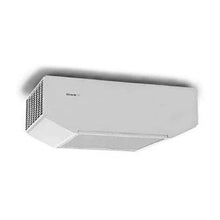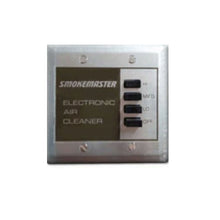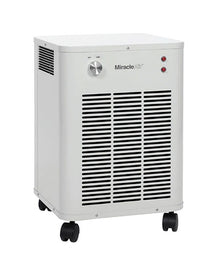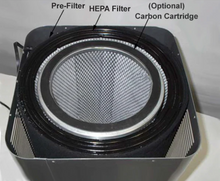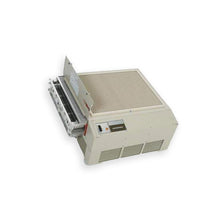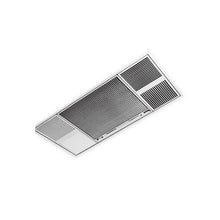Smart Air Purifiers for Commercial Spaces: Features and Benefits for Effortless Air Quality Management

In today's fast-paced commercial world, where health and productivity are paramount, the air we breathe indoors has never been more critical. Businesses are increasingly recognizing that the quality of their indoor environment directly impacts employee well-being, customer experience, and even operational efficiency. But how can businesses effectively manage something as invisible yet pervasive as air quality? The answer lies in the intelligent integration of technology: smart commercial air purifiers.
At Commercial Air Purifiers, LLC, we understand the complexities of maintaining optimal indoor air quality (IAQ) in diverse commercial settings, from bustling offices and vibrant retail spaces to healthcare facilities and educational institutions. We believe that achieving superior air quality shouldn't be a constant manual effort, but rather an effortless, automated process. This is where the power of smart commercial air purifiers, driven by automated air quality control and IoT air filtration, truly shines.
The Invisible Threat: Why Indoor Air Quality Demands Attention
We spend an overwhelming majority of our lives indoors – for many, it's approximately 90% of our time. While we often focus on outdoor air pollution, the air inside our buildings can be significantly more contaminated. The U.S. Environmental Protection Agency (EPA) notes that concentrations of some pollutants can be two to five times higher indoors than typical outdoor concentrations. This isn't just an inconvenience; it's a serious concern for health and business performance.
Commercial spaces are particularly susceptible to a cocktail of indoor air pollutants. These can include:
-
Particulate Matter (PM2.5 and PM10): Tiny airborne particles from dust, pollen, mold spores, and even smoke, which can penetrate deep into the lungs and bloodstream.
-
Volatile Organic Compounds (VOCs): Gases emitted from everyday products like cleaning supplies, paints, furnishings, and office equipment. VOCs can cause headaches, nausea, and long-term health issues.
-
Allergens: Pet dander, dust mites, and pollen, which trigger allergic reactions and asthma attacks.
-
Pathogens: Bacteria and viruses, including those responsible for respiratory illnesses, that can spread through airborne droplets.
-
Carbon Dioxide (CO2): A byproduct of human respiration that, when accumulated in poorly ventilated spaces, can lead to fatigue, reduced cognitive function, and decreased productivity.
The impact of poor IAQ on businesses is significant and often underestimated. A Harvard University study revealed that employees in poorly ventilated environments with high CO2 levels may experience a 50% decrease in cognitive performance and an increase in sick days, a phenomenon often referred to as "sick building syndrome" (SBS). Another study highlighted that improved IAQ can boost cognitive performance by 61% and productivity by 10%. Beyond human health, poor IAQ can also strain HVAC systems, increasing energy consumption and potentially damaging electronics and other assets.
The solution isn't just about introducing any air purification system; it's about deploying intelligent, connected solutions that adapt to real-time conditions and require minimal manual intervention.
The Rise of Smart Air Purifiers: A Paradigm Shift in Air Quality Management
Traditional air purifiers have served a valuable purpose, but they often require manual monitoring and adjustments. Smart commercial air purifiers represent a significant leap forward, leveraging the Internet of Things (IoT) to provide automated, data-driven air quality control. These devices are equipped with sophisticated sensors and connectivity that allow them to:
-
Monitor air quality in real-time: Continuously measure levels of various pollutants like PM2.5, VOCs, and CO2.
-
Automate operation: Adjust fan speed and filtration levels based on detected pollutant levels, ensuring optimal purification without constant manual input.
-
Provide data insights: Offer comprehensive data on historical air quality trends, energy consumption, and filter lifespan through intuitive dashboards and mobile apps.
-
Integrate with existing systems: Connect seamlessly with Building Management Systems (BMS) and HVAC infrastructure for a holistic approach to environmental control.
-
Enable remote control and alerts: Allow facility managers to monitor and control units from anywhere, receiving instant notifications if air quality deviates from desired parameters.
Unpacking the Features: What Makes a Smart Commercial Air Purifier "Smart"?
As Commercial Air Purifiers, LLC, we recognize that the "smart" in smart air purifiers goes beyond simple remote control. It encompasses a suite of features designed for efficiency, effectiveness, and ease of management in commercial settings.
1. Real-time Air Quality Monitoring and Feedback
The cornerstone of any smart air purifier is its ability to sense and analyze the air. High-quality smart purifiers feature advanced sensors that detect:
-
Particulate Matter (PM): Crucial for identifying dust, pollen, smoke, and airborne viruses.
-
Volatile Organic Compounds (VOCs): Essential for detecting chemical emissions from cleaning products, paints, and furnishings.
-
Carbon Dioxide (CO2): A key indicator of ventilation effectiveness and occupant density, directly impacting cognitive function.
-
Temperature and Humidity: While not direct pollutants, these factors influence comfort and can contribute to mold growth.
This real-time data is typically displayed on the unit itself, a connected mobile app, or a central building management dashboard, providing immediate insights into the indoor environment. Facility managers can see exactly what's in the air and how their purification system is responding.
2. Intelligent Automation and Adaptive Operation
Gone are the days of manually adjusting fan speeds. Smart purifiers use the data from their sensors to automatically adapt their operation. If VOC levels spike after a cleaning crew has been through, the purifier can automatically increase its fan speed to clear the air more rapidly. If the office is empty overnight, it can shift to a lower, energy-saving mode. This automated response ensures:
-
Consistent air quality: The system continuously works to maintain healthy pollutant levels.
-
Energy efficiency: Power consumption is optimized, reducing operational costs. Studies suggest that AI air monitoring management systems can reduce energy costs by 20-35% through optimized HVAC and ventilation control.
-
Extended filter life: Filters are used more efficiently, only working harder when necessary, which can prolong their lifespan.
3. IoT Connectivity and Remote Management
The "IoT air filtration" aspect is what truly elevates these devices. Connected to the internet, smart purifiers offer:
-
Remote Control: Adjust settings, turn units on/off, and set schedules from anywhere via a smartphone or web application. This is particularly valuable for managing multiple units across a large commercial space or even different locations.
-
Alerts and Notifications: Receive instant alerts for critical events, such as high pollutant levels, filter change reminders, or system malfunctions. This proactive approach allows for immediate intervention, preventing prolonged exposure to unhealthy air.
-
Data Logging and Reporting: Comprehensive historical data allows businesses to track air quality trends over time, identify potential problem areas, and demonstrate compliance with internal or external health standards. This data can be invaluable for regulatory reporting and showcasing a commitment to employee well-being.
4. Advanced Multi-Stage Filtration Systems
While the "smart" features relate to control and monitoring, the core function of an air purifier remains filtration. Smart commercial air purifiers integrate state-of-the-art filtration technologies, often including:
-
Pre-filters: Capture larger particles like dust and hair, extending the life of subsequent filters.
-
HEPA (High-Efficiency Particulate Air) filters: Capable of capturing 99.97% of airborne particles 0.3 microns in size, including dust, pollen, mold spores, and many bacteria and viruses.
-
Activated Carbon filters: Highly effective at absorbing gases, odors, and VOCs from the air.
-
Optional Technologies: Some advanced systems may include UV-C light for germicidal irradiation or photocatalytic oxidation (PCO) for breaking down VOCs and other airborne contaminants.
The combination of intelligent monitoring and robust filtration ensures that the air is not just cleaned, but continuously optimized for health and comfort.
The Tangible Benefits for Your Business
Investing in smart commercial air purifiers isn't just about providing clean air; it's about making a strategic investment in your business's overall success.
1. Enhanced Employee Health and Productivity
This is perhaps the most direct and impactful benefit. As Commercial Air Purifiers, LLC, we've seen firsthand how a healthier indoor environment translates into a more engaged and productive workforce.
-
Reduced Absenteeism: By removing allergens, irritants, and airborne pathogens, smart air purifiers can significantly reduce instances of allergies, asthma attacks, and the spread of common illnesses. A Harvard study (2000) found that employees in moderately ventilated spaces were 53% more likely to take sick days than those in highly ventilated sections. Proactive air purification can save businesses an estimated $480 per employee annually.
-
Improved Cognitive Function: Cleaner air, especially with optimized CO2 levels, directly correlates with better concentration, problem-solving skills, and decision-making abilities. Employees who feel better physically are more likely to perform at their peak.
-
Increased Morale and Retention: Demonstrating a tangible commitment to employee health and safety fosters a positive work environment. Employees are more likely to feel valued and supported, leading to higher job satisfaction and lower turnover rates.
2. Elevated Customer and Client Experience
For retail, hospitality, healthcare, and other customer-facing businesses, IAQ plays a crucial role in creating a welcoming and comfortable atmosphere.
-
Positive First Impressions: Fresh, clean-smelling air immediately sets a positive tone. Customers are more likely to linger and return to spaces where they feel comfortable.
-
Reduced Health Concerns: In spaces like clinics or gyms, clean air provides reassurance and protects vulnerable individuals.
-
Brand Reputation: Prioritizing IAQ showcases a company's dedication to wellness and safety, enhancing its brand image and attracting environmentally conscious clients.
3. Significant Operational Efficiencies and Cost Savings
The "smart" aspect of these purifiers delivers tangible economic benefits.
-
Energy Savings: Automated operation ensures that purifiers only run at necessary levels, preventing wasted energy. Integration with HVAC systems can further optimize energy consumption by reducing the load on heating and cooling.
-
Extended HVAC Lifespan: By removing airborne contaminants, air purifiers reduce the amount of dust and debris entering HVAC systems, leading to less wear and tear, fewer breakdowns, and lower maintenance costs.
-
Predictive Maintenance: IoT sensors can monitor filter life and component health, alerting facility managers when maintenance is needed before a problem occurs. This shifts from reactive repairs to proactive, scheduled maintenance, minimizing downtime and unexpected expenses.
-
Regulatory Compliance: Comprehensive data logging and reporting capabilities simplify compliance with evolving indoor air quality standards and demonstrate due diligence.
4. Adaptability and Future-Proofing
The modular and connected nature of smart air purifiers means they can evolve with your business needs and technological advancements.
-
Scalability: Easily add more units as your business expands or as needs change within existing spaces.
-
Over-the-Air Updates: Many smart purifiers can receive software updates, improving functionality and efficiency over time without requiring hardware replacement.
-
Data-Driven Decisions: The wealth of data collected allows businesses to make informed decisions about their ventilation strategies, identifying areas for improvement and optimizing resource allocation.
Real-World Impact: Case Studies and Research
The efficacy of air purification and the benefits of improved IAQ are well-supported by research. For instance, a recent randomized controlled trial in Milan evaluating portable air purifiers in schools demonstrated a 32% reduction in indoor PM2.5 concentrations and a 12.5% decrease in student absenteeism. This highlights the direct impact of cleaner air on health and attendance, a principle that extends directly to the commercial workplace.
Another study confirmed that air purifiers equipped with HEPA filters are highly efficient in removing both ultrafine and coarse particles, with removal efficiencies exceeding 95% for many particle sizes. This scientific backing underscores the effectiveness of the core filtration technology within smart commercial air purifiers.
Organizations like the World Health Organization (WHO) and the EPA consistently provide guidelines and recommendations for maintaining healthy indoor air quality, emphasizing the importance of ventilation and filtration. The WHO's updated air quality guidelines (2021) set stringent targets for particulate matter, recognizing its profound impact on health. By adopting smart air purification, businesses align themselves with these global health recommendations, demonstrating a commitment to world-class indoor environments.
Practical Steps Towards Smarter Air Quality
As Commercial Air Purifiers, LLC, we recommend a phased approach to implementing smart air purification, ensuring a seamless transition and maximum benefit.
-
Assess Your Current IAQ: Before deploying solutions, understand your baseline. Utilize portable air quality monitors or professional IAQ testing services to identify existing pollutant levels and potential problem areas.
-
Define Your Needs: Consider the size of your space, the type of pollutants prevalent (e.g., offices might have more VOCs, manufacturing facilities more particulate matter), and your budget. This will help determine the appropriate type and number of smart air purifiers.
-
Choose the Right Technology Partner: Look for providers who offer robust, reliable smart air purifiers with proven filtration technology, intuitive management platforms, and excellent customer support. We, Commercial Air Purifiers, LLC, pride ourselves on delivering solutions that are not only effective but also user-friendly and built to last.
-
Strategic Placement: Optimize the placement of your smart air purifiers to maximize their effectiveness. Consider areas with high foot traffic, poor ventilation, or known pollutant sources.
-
Integrate and Automate: Connect your smart purifiers to your existing network and, if possible, integrate them with your building management system (BMS) for centralized control and data analysis. Set up automated schedules and triggers based on real-time air quality readings.
-
Regular Maintenance: Even smart purifiers require attention. Adhere to recommended filter replacement schedules and perform routine cleaning to ensure optimal performance and longevity. Most smart systems will alert you when filters need changing, taking the guesswork out of maintenance.
Conclusion: Breathing Easier, Working Smarter
The landscape of commercial spaces is evolving, with a growing emphasis on health, sustainability, and intelligent operations. Smart commercial air purifiers are not just another piece of equipment; they are a vital component of a modern, health-conscious business strategy. By seamlessly integrating advanced filtration with IoT-powered automation and real-time monitoring, these devices offer effortless air quality management, freeing businesses to focus on their core operations while enjoying the profound benefits of cleaner, healthier indoor environments.
At Commercial Air Purifiers, LLC, our mission is to empower businesses with the tools they need to achieve superior indoor air quality. We believe that when your employees and customers breathe easier, your business thrives. Embrace the future of air quality management and discover the tangible impact that smart air purifiers can have on your commercial space.
About the Author: Commercial Air Purifiers, LLC
Commercial Air Purifiers, LLC is a leading provider of advanced air purification solutions for businesses of all sizes. With years of experience and a deep understanding of indoor air quality challenges, we are committed to bringing the best and most innovative air purifiers to the market. Our expertise lies in designing and implementing tailored solutions that not only meet but exceed industry standards, ensuring healthier, more productive, and more sustainable commercial environments. We believe in transparent information, credible sourcing, and empowering businesses with the knowledge to make informed decisions about their indoor air.

